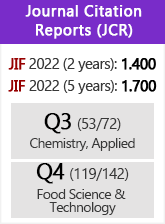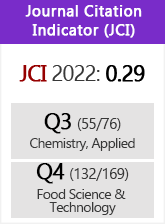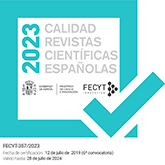Dehydrated soup cubes fatty components characterization
DOI:
https://doi.org/10.3989/gya.1999.v50.i1.633Keywords:
Dehydrated soup cube, Differential scanning calorimetry (DSC), Fat, Thermal stability.Abstract
Fats represent a major part of the weight of dehydrated soup cubes. As these products are stored at room temperature, the fatty components should show no partial melting during the Summer months. Six fatty raw materials, mixtures of these fats already prepared by the manufacturer and lipidic extracts from the finished cubes (both hen and vegetables soups) are analyzed in this work, trying to relate origin (fatty acid composition) with stability against temperature changes (DSC thermogram). Some of the studied fats are found acceptable according to the expected shelf life of the product, although others should be modified before usage, either by fractioning or by hydrogenation.
Downloads
Download data is not yet available.
Downloads
Published
1999-02-28
How to Cite
1.
Correa-Cabrera R, Capote A, Rodríguez-Ayán MN, Grompone MA. Dehydrated soup cubes fatty components characterization. Grasas aceites [Internet]. 1999Feb.28 [cited 2024Apr.18];50(1):30-6. Available from: https://grasasyaceites.revistas.csic.es/index.php/grasasyaceites/article/view/633
Issue
Section
Research
License
Copyright (c) 1999 Consejo Superior de Investigaciones Científicas (CSIC)

This work is licensed under a Creative Commons Attribution 4.0 International License.
© CSIC. Manuscripts published in both the printed and online versions of this Journal are the property of Consejo Superior de Investigaciones Científicas, and quoting this source is a requirement for any partial or full reproduction.All contents of this electronic edition, except where otherwise noted, are distributed under a “Creative Commons Attribution 4.0 International” (CC BY 4.0) License. You may read here the basic information and the legal text of the license. The indication of the CC BY 4.0 License must be expressly stated in this way when necessary.
Self-archiving in repositories, personal webpages or similar, of any version other than the published by the Editor, is not allowed.
















